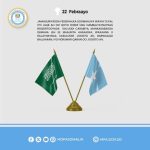WHO(SONNA)-On 1 December WHO is calling on global leaders and citizens to rally for “global solidarity” to maintain essential HIV services during COVID 19 and beyond – and to ensure continued provision of HIV services for children, adolescents and populations most at risk for the disease. The Organization also calls on countries to provide health workers with greater protection and support so they can continue their work safely during the pandemic.
Protecting people from HIV during the pandemic, and ensuring they can maintain treatment, is critical. Researchers are currently investigating whether people with HIV have an increased risk of poor outcomes with COVID-19. Preliminary evidence of a moderate increased vulnerability of people with HIV makes it even more urgent that people with HIV have access to antiretrovirals (ARVs) and treatments for co-morbidities – such as treatment for non communicable diseases (NCDs), chronic obstructive pulmonary disease (COPD), diabetes and tuberculosis.
“On World AIDS Day 2020, we pay tribute to the communities and countries who have shown resilience and innovation – often spearheaded by people themselves living with HIV,“ says Dr Meg Doherty, Director of WHO’s Department of Global HIV, Hepatitis and STI Programmes. “This is vital, because while we focus on fighting this new pandemic, we must not drop our guard on a twin pandemic that has been with us for 40 years and which is far from over.”
WHO and partners sounded the alarm earlier this year, concerned at the impact of reported disruptions in service delivery. But now, thanks to the unstinting work of health and community workers, the number of countries reporting disruptions in HIV services has declined by almost 75% since June. Only 9 of the 152 countries surveyed are still reporting disruptions (maps: June 2020 – November 2020); and in June, 24 countries reported less than 3 months supply of ARVs, while now only 12 report a critically low stock.
This is mainly due to the implementation of existing guidelines, including providing multi-month dispensing (MMD) of ARVs for 3-6 months to patients who did not have access to health facilities; strong WHO-led global, regional, country, manufacturer and partner coordination to ensure adequate supply of drugs stocks, and sustained provision of facility-based essential health services and community delivery mechanisms.
WHO hopes that some of the innovative approaches adopted during COVID-19 can help the world catch up and accelerate progress towards our new 2025 targets and the SDG goals of ending AIDS as a public health threat by 2030.
@WHO





